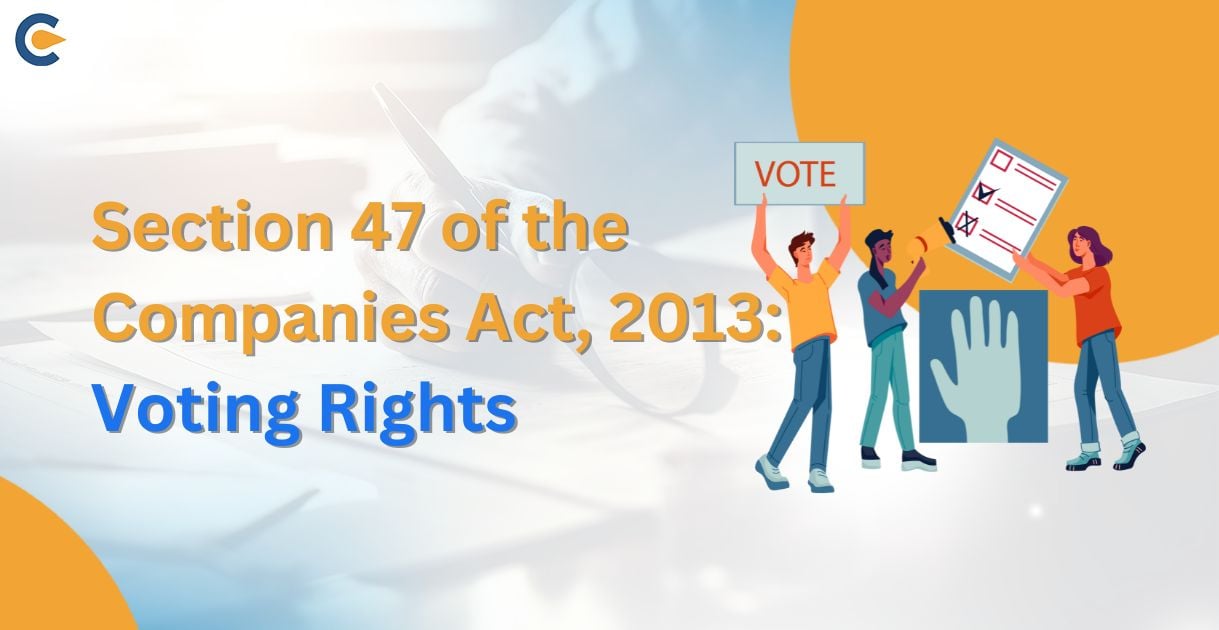The Companies Act, 2013, is a pivotal piece of legislation governing the corporate landscape in India. This comprehensive act, which replaced the erstwhile Companies Act, 1956, came into effect on April 1, 2014. The Act introduced a significant overhaul of India’s company law framework, aligning it with modern business practices and international standards.
The need for a new Companies Act in India was felt due to changing economic dynamics and the desire to create a more transparent and investor-friendly environment. The Companies Act, 2013, brought about several fundamental changes to enhance corporate governance, increase accountability, and promote sustainable business practices.
One of the notable features of the Companies Act, 2013, is its incorporation of principles such as corporate social responsibility (CSR) and the introduction of new concepts like one-person companies. It also strongly emphasises protecting the rights and interests of shareholders and stakeholders, thereby promoting the overall growth and development of the Indian corporate sector.
Over the years since its enactment, the Companies Act, 2013, has seen various amendments and notifications to address emerging challenges and fine-tune its provisions. It has been instrumental in shaping India’s corporate landscape by providing a robust regulatory framework for businesses of all sizes, from small start-ups to large corporations.
In essence, the Companies Act, 2013, has played a pivotal role in fostering economic growth and development in India by facilitating ease of doing business, ensuring corporate transparency, and aligning with global best practices in corporate governance.
Investors who purchase shares in a company are entitled to specific rights, with one of the most significant being the ability to participate in voting on important corporate matters. The extent of these voting rights is typically determined by the percentage of their ownership in the company’s paid-up equity share capital. For example, if a shareholder owns 51% of the company’s stake, they have the authority to exercise majority control over the company. Section 47 of the Companies Act, 2013, is the legal provision that grants and regulates shareholder voting rights. This includes crucial matters such as electing directors and approving significant changes that impact the company’s operations.
Exploring the Concept of Voting Rights
Voting rights in a company serve as a fundamental distinction between equity shareholders and preference shareholders. In general terms, the equity shareholders possess the privilege to vote, while preference shareholders do not have this right regarding the company’s affairs.
This distinction arises from the fact that equity shareholders effectively function as the owners of the company, and as such, their input carries significant weight in the company’s decision-making processes. Preference shareholders, on the other hand, lack ownership rights over the company’s assets, placing them in a more outsider position compared to equity shareholders. This absence of voting rights for preference shareholders stems from their limited connection to the company’s core operations.
Furthermore, preference shareholders enjoy a relatively secure position within the company, especially in contrast to equity shareholders. In the event of liquidation, equity shareholders may have to bear a portion of the company’s liabilities, making them more exposed to the consequences of poor management decisions. This inherent difference in the level of risk and involvement is why equity shareholders are granted voting rights, whereas preference shareholders are not. These voting rights for equity shareholders serve as a means to protect their interests and provide them with a say in key corporate decisions.
To grasp the concept of voting rights, a close examination of Section 2(93) in conjunction with Section 47 of the Companies Act is essential.
According to Section 2(93) of the Companies Act, voting rights are defined as “the right of a member of a company to vote in any meeting of the company or by means of postal ballot.”
In practical terms, voting rights represent the decision-making authority vested in the members of a company. During general meetings of the company, they enable these members to express their approval or disapproval of resolutions presented for consideration. As prescribed by the Act, the significance of voting rights extends the power to participate in decision-making beyond the confines of the company’s top management. This inclusion encompasses shareholders, especially equity shareholders, allowing them to actively contribute their perspectives and preferences to the ultimate decisions made by the company.
Methods of Voting in a Company
In the context of corporate decision-making, voting in a company can be executed through four distinct methods: voting by a show of hands, by utilizing postal ballots, through electronic means, and by opting for a poll.
- Voting by Show of Hands: During general meetings of the company, the most common method is voting by a show of hands. Regardless of their shareholding, each investor is accorded one vote (Section 107).
- Voting by Poll: If the members present and voting represent at least one-tenth of the total voting power or have shareholdings of a value not less than five lakh rupees or more, the members may request a poll (Section 109).
- Voting by Electronic Means: Companies listed on the stock exchange with more than 1000 shareholders are mandated to offer their shareholders the option of electronic voting (e-voting) (Section 108).
- Voting by Postal Ballot: To cater to shareholders who do not have access to e-voting, every listed company is required to facilitate voting through postal ballots (Section 110).
The Legal Framework for Voting Rights
- Shareholder Categories:
In a company, there are typically two categories of shareholders: equity and preferred. The allocation of voting rights for both categories is outlined in Section 47 of the Companies Act, 2013.
- Equity Shareholders’ Voting Rights:
Equity shareholders possess the right to participate in the company’s general meetings and cast their votes on every resolution presented before the company, as stipulated in clause (a) of sub-section (1) of Section 47of the Companies Act. It’s worth noting that notice of such meetings must be served to every equity holder, as per Section 101 of the Companies Act, 2013.
- Voting Proportionality:
When it comes to voting via a poll, the voting right is proportionate to the shareholder’s stake in the company’s paid-up equity share capital, as per clause (a) of sub-section (1) of Section 47 of the Companies Act, 2013. However, for Nidhi companies, a modification outlined in a Notification dated June 5, 2015, limits an individual member from exercising voting rights on a poll exceeding five per cent of the total voting rights of equity shareholders.
- Preference Shareholders’ Voting Rights:
Members holding preference share capital possess the right to vote solely on agenda items or resolutions that directly impact the rights associated with their shares. These include resolutions concerning the winding up of the company, repayment of the company, and reductions in equity or preference share capital. When voting on a poll, their voting rights are in proportion to their holdings in the paid-up preference share capital of the company.
Additionally, the proportion of voting rights of equity shareholders compared to preference shareholders is aligned with the ratio of paid-up capital for equity shares to paid-up capital for preference shares. Furthermore, suppose a class of preference shareholders has not received dividends for a period of two years or more. In that case, they gain the right to vote on all resolutions presented before the company.
Voting Rights of Preference Shareholders under Section 47 of the Companies Act
Section 47 of the Companies Act addresses the voting rights of both equity and preference shareholders. Sub-section (2) of Section 47 of the Companies Act specifically outlines the voting rights of preference shareholders, shedding light on when and how they can exercise this privilege.
According to sub-section (2) of Section 47 of the Companies Act, preference shareholders in a company limited by shares have the right to vote exclusively on resolutions that directly impact the rights attached to their preference shares. This means that their voting authority is limited to matters that pertain to their shares. Additionally, preference shareholders can exercise their voting rights in specific situations, including resolutions related to the winding up of the company, or resolutions concerning the repayment or reduction of the company’s equity or preference share capital.
The extent of their voting rights, especially when it comes to a poll, is proportionate to their share in the paid-up preference share capital of the company. However, the proportional relationship between the voting rights of equity shareholders and preference shareholders is determined by the ratio of paid-up capital for equity shares to paid-up capital for preference shares.
Furthermore, a noteworthy provision in sub-section (2) of Section 47 of the Companies Act states that if a class of preference shareholders has not received dividends for a period of two years or more, they gain the right to vote on all resolutions presented before the company. In essence, preference shareholders’ voting rights are closely tied to events that affect their interests or key corporate decisions.
Understanding Differential Voting Rights (DVR) in Shares
Differential Voting Rights (DVR) shares are a unique class of shares that grant shareholders varying degrees of voting power, deviating from the standard voting rights accorded to ordinary shareholders within a company. These DVR shares, which are part of the equity share capital, come with distinctive voting and dividend rights, setting them apart from the regular equity shares.
There are essentially two categories of DVR shares:
- Shares with Superior Voting Rights: These shares bestow upon their holders increased voting privileges compared to ordinary shareholders. However, they often come with lower dividend rates.
- Shares with Inferior Voting Rights: Conversely, shares with inferior voting rights grant their holders reduced voting influence within the company. In return, they typically offer higher dividend yields.
The allocation of shares with superior voting rights is commonly directed towards the company’s promoters, key managerial personnel, and managing directors. The voting rights attached to these shares can vary, with ratios like 2:1 (translating to 2 votes for every 1 share) or even 10:1 (10 votes for every 1 share).
In the context of start-ups, where founders may face the challenge of losing control over their company as they dilute their ownership through multiple rounds of funding, DVR shares serve as an effective solution. These shares allow promoters to maintain significant control over the company’s decisions and direction, even as they bring in external investors.
It’s important to note that as per the Companies (Share Capital and Debentures) Rules, 2014, the issuance of shares with DVR should not surpass 74% of the total share capital at any given time. This limit marks an increase from the previous threshold of 26%, as per an amendment.
Impact of Exemptions on Private Companies
The exemptions granted to private companies have brought about several positive effects:
- Non-Voting Right Shares: Private companies have been granted the flexibility to issue non-voting right shares. This exemption empowers them to structure their capital in a way that doesn’t entail a dilution of control. It allows these companies to maintain their decision-making authority while raising funds.
- Benefit for Private Equity Funds: Private equity funds, which often prioritise instruments with flexible rights concerning dividends, liquidation, and voting entitlement, have found significant relief due to these exemptions. The exemptions enable them to structure instruments that align with their investment strategies.
- Facilitating Foreign Investors: These exemptions facilitate private companies in structuring returns and liquidation preferences to attract foreign investors. For instance, when dividends are paid on compulsorily convertible preference shares issued to foreign investors, there may be restrictions on the dividend rate. However, structuring investments through equity shares with differential rights can bypass such limitations, making it more appealing to foreign investors.
In essence, these exemptions have provided private companies with the flexibility to tailor their capital structure to suit their needs and attract investments, whether from domestic or foreign sources, while preserving control and accommodating various investor preferences.
Conclusion:
In conclusion, Section 47 of the Companies Act plays a pivotal role in delineating shareholders’ voting rights, distinguishing between equity and preference shareholders, and establishing the circumstances under which these rights can be exercised. It serves as a fundamental framework for corporate governance, ensuring that shareholders, especially equity shareholders, have a voice in critical company decisions. The provision’s nuanced approach accounts for various scenarios, such as differential voting rights and the involvement of preference shareholders when their interests are at stake. Ultimately, Section 47 of the Companies Act fosters transparency, accountability, and fairness within companies, striking a balance between the interests of different classes of shareholders and contributing to the robust functioning of corporate entities in India.
Frequently Asked Questions (FAQs)
Section 47 of the Companies Act 2013 in India states that every member of a company limited by shares and holding equity share capital has the right to vote on every resolution placed before the company. The voting right on a poll is in proportion to the member’s share in the paid-up equity share capital of the company.
No, shareholders may have different classes of shares with varying voting rights. The voting rights attached to each class are typically defined in the company’s articles of association.
Yes, a company can issue shares with differential voting rights, provided it complies with the provisions and requirements of Section 47 of the Companies Act and other related regulations.
DVRs are a type of shares that carry different voting rights compared to ordinary shares. Depending on the company’s policies, they may grant more or fewer votes per share.
Generally, debenture holders do not have voting rights under Section 47 of the Companies Act unless they have been granted such rights by the company’s debenture trust deed or in specific circumstances outlined in the articles of association.
The issuance of preference shares typically dilutes the voting power of existing equity shareholders since preference shareholders usually have limited or no voting rights.
Cumulative voting allows shareholders to cumulatively vote for a single candidate or distribute their votes among multiple candidates. This may affect the balance of power on the board of directors.
Voting shares confer the right to vote on corporate matters, while non-voting shares do not grant this privilege, primarily focusing on dividend entitlement.
Section 43 and Section 47 of the Companies Act, 2013: The Ministry of Corporate Affairs (MCA) has clarified that these sections pertaining to shared capital and voting rights need not apply to private companies if their memorandum or articles of association (MOA or AOA) specify otherwise. In effect, the MOA and AOA of a Private Company can take precedence, resulting in the following key implications:
Issuance of shares without voting rights is permitted.
Preference shareholders may have the right to vote on all matters, depending on the terms of their share issuance.
Private Companies have the flexibility to create additional classes of shares beyond just Preference and Equity, tailored to their specific needs.
When a private company is exempted from Section 47 of the Companies Act, it means that the rule requiring voting rights to be in proportion to the amount paid for shares is not applicable. This exemption allows private companies to have disproportional voting rights on their shares. However, it’s important to note that even in the case of non-payment of dividends on preference shares in a private company, shareholders’ voting rights are protected. Private companies can choose to include conditions related to voting rights based on dividend payments at the time of share issuance. This exemption reinforces the flexibility and autonomy of private companies in structuring their share capital.
Preference shareholders usually do not have voting rights under Section 47 of the Companies Act, except in certain circumstances as specified by the Companies Act or the company’s articles of association.
Read Our Article: Section 31 Of The Companies Act, 2013: Shelf Prospectus










